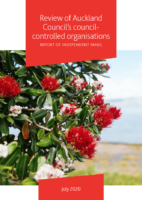 The Panel has now completed its review and provided its report to the Governing Body for its consideration.
The Panel has now completed its review and provided its report to the Governing Body for its consideration.
The full report is now available on the CCO Review webpage on the Auckland Council website.
Community consultation and accountability is a key theme of the report, some of the outtakes and recommendations:
“Too much has been made of the notion that CCOs are commercial entities. They are not. Some of their activities are commercial in nature and they must often exercise commercial judgement and business expertise, but at heart they are community-owned entities that exist to provide services to those who partly or wholly fund them – Aucklanders. As a result, they must be more conscious of community expectations and appropriately balance commercial and public interests.”
“One of our main tasks was to consider whether CCOs are sufficiently accountable to the council and the community. The short answer is the council has all the necessary levers at hand to ensure accountability, but it is not using them effectively – and in one important respect, not at all. Yet strong accountability (including transparency) is at the heart of good local government – and it also goes both ways.”
“The accountability mechanisms themselves are not without problems either. Letters of expectation, for example, are too vague and fail to give CCOs adequate guidance in preparing their statements of intent. CCOs’ statements of intent vary enormously in length, clarity, presentation and performance measures and are poorly aligned to CCOs’ activities and objectives. CCOs’ reporting to the council is also variable and is missing vigorous discussion of their performance. There are far too many local board engagement plans – an incredible 105 – and there is no monitoring of their implementation. The council’s governance manual for CCOs is far too long (it should be focused on the council’s expectations of CCOs) and it should not hesitate to use its statutory power to direct CCOs to comply with its plans and strategies when necessary – something it has never once done.”
“CCOs’ interactions with local boards does not result in effective accountability. CCOs largely inform local boards about projects in their area rather than seek real input into their design. CCOs are also not sufficiently responsive to local boards’ concerns and do not co-ordinate their efforts in local board areas with other CCOs. The time has come for local boards and senior CCO managers to sit down and thrash out a more meaningful way of working together. And local boards need to show more initiative in their relationships with CCOs when it comes to integrating their planning into CCOs’ own planning.“
“As for being accountable to customers and ratepayers, CCOs certainly understand the theory, but the practice is another matter: the feedback from the public on this score was overwhelmingly negative. Responsiveness to queries or complaints was slow – and complaints were frequently about the tardiness of minor works or the excessive heed paid to commercial interests over public interests (the latter hardly helped by the fact CCOs’ constitutions are silent on balancing these considerations). The make-up of CCO boards could do with a greater diversity of skills and ethnicities.”
34. CCOs and local boards reset how they engage with one another, by means of:
- a workshop to develop a more meaningful way for CCOs and local boards to work together
- the preparation of joint CCO engagement plans for each local board
- more initiative by local boards in integrating their own planning with CCO planning
- liaison between CCOs and local boards at a more senior level so CCOs can quickly remedy local board concerns
- the preparation of joint CCO six-monthly reports for each local board
- the communication of clear, up-to-date information from CCOs to local boards on projects in their area.
42. The council gives CCOs guidance on how to balance public and commercial interests and amends their constitutions to make explicit that each CCO must meet both objectives.
56. The council and CCOs explore options to give ratepayers a more effective voice in what happens in Auckland and also how, short of court proceedings, to challenge CCO or council decisions.
UPDATE
At its meeting of 27 August 2020 the Auckland Council’s Governing Body agreed unanimously to progress all 64 recommendations made by an independent review of its council-controlled organisations (CCOs).
This includes agreeing to the merger of two CCOs—Regional Facilities Auckland (RFA) and Auckland Tourism, Events and Economic Development (ATEED)—into a single entity to be established by 1 December 2020, which the CCO Review suggests could save up to $67 million over the next decade.
